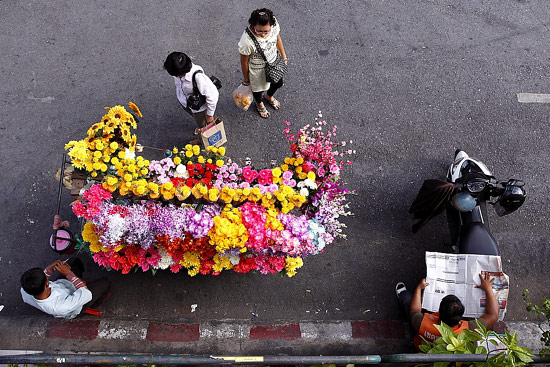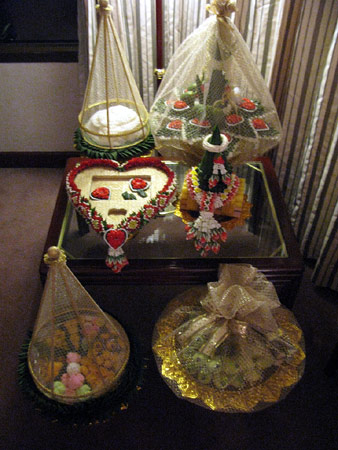Culture and Society: Gift Giving
General
Thais have a collective mentality and close kinship ties, thus gifts tend to be exchanged primarily between good friends and family members. Thais do not expect much formality when it comes to offering gifts, but they are usually given and received with the right hand and opened later in private to avoid a public display of emotion, which is thought to be unseemly.
Hospitality Gifts
When invited to a home for supper, Thais consider it polite to take along a small gift for the lady of the house. This practice isn't necessarily expected, but is welcomed. Presents can range from cut flowers to fruit, or candies to cake. Liquor is welcome if the guest is sure that the hostess imbibes.
Thais value appearances, so the present tends to be wrapped artistically in royal colors (gold or yellow) that appeal to the Thai love for the monarchy. Bows and ribbons are thought to add a sense of occasion. Chinese Thais typically prefer red wrapping paper which is thought to bring good fortune. It is customary for gifts to be presented with the right hand followed by a wai (the placing of the palms together with the fingers extended, hands held to chest while bowing).
Personal Gifts
The gregarious Thai love to celebrate religious festivals, public events, and family milestones with orgies of gift giving. There are no fewer than three New Years on the official calendar. On January 1, cookies, baskets full of tinned fruit, and liquor are swapped between family and friends who get together for a meal or a party. At Chinese New Year, ang pao (lucky red envelopes of cash) are given to children, whatever their ethnicity. Songkran (Thai New Year) in April is marked by street parties during which younger people show respect for their superiors by giving older people and monks food and money.
When a Thai baby is born, it is customary for a relative to donate a number of birds or fish equal to that relative’s age. These creatures are then let free at a ceremony in order to please the gods and persuade them to let the baby live a long and happy life.
At Thai weddings, guests tend to bequeath domestic items to the happy couple to assist with the establishment of a new household. These are usually wrapped in the royal colors. Envelopes of money are also acceptable. Wedding presents are normally handed over after the guestbook is signed.
A vestige of ancient Thailand’s embrace of Hinduism, Divali (Festival of Light) is still celebrated today. People gather together merrily, exchanging gifts with both casual and intimate acquaintances. It’s de rigeur to offer close family clothes, electronic gizmos, and jewelry, while more distant friends trade candies and fruit.
Business Gifts
The Thai preoccupation with geniality and harmony extends to the workplace, with gifts normally exchanged during a second business meeting. Modest business gifts are commonplace and seldom mistaken for bribery. By and large, these are professionally apt items such as pens, calendars, company T-shirts, desk accessories, and business books. Foreigners are expected to bring something that represents their country of origin, such as a photographic book, local delicacy, or handicraft. This is all in the spirit of cultural interchange—an important Thai business value. Business gifts are presented and received with the same protocol used for hospitality gifts (see above).
The collective mindset of Thais means that it’s quite common for a clerical worker to bring food—usually fruit—to the office and leave it in the kitchen to share with colleagues.
At Songkran, gift baskets of fine foodstuffs are typically offered to one company on behalf of another. Such an item is normally left in a common area so that all employees can share the contents.
Taboos
Men seldom give women they don’t know well perfume or handkerchiefs, as these are deemed too personal.
Sharp objects such as mirrors, knives, and scissors can be construed as aggressive.
Flowers such as carnations and marigolds, and wrapping paper that is green, blue, or black are all associated with death and funerals.
Thais typically avoid praising one another’s possessions, as this may obligate the owner to give the item away according to the dictates of hospitality.
Article written for World Trade Press by Tom Sykes.
Copyright © 1993—2025 World Trade Press. All rights reserved.

 Thailand
Thailand 

